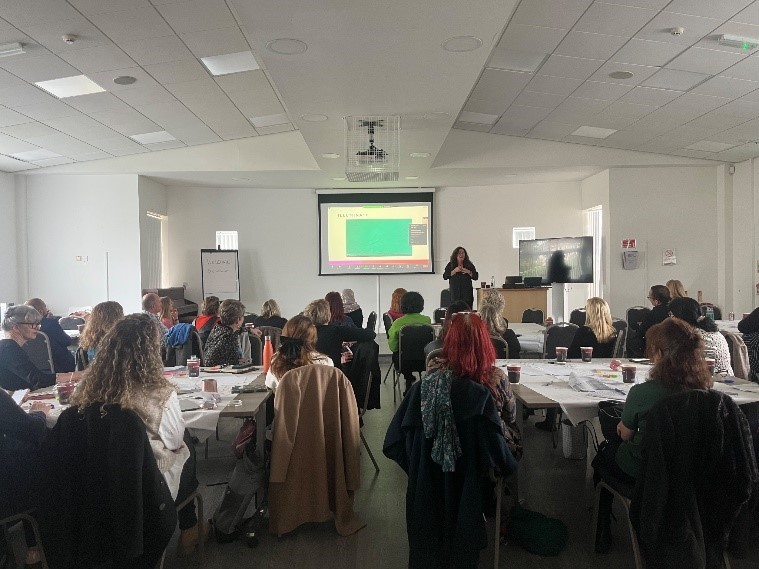Blackpool event shares the benefits of Mobilising Community Assets in Coastal Communities

The Arts and Humanities Research Council (AHRC) funded a collaborative hybrid event, held at the Grange Community Hub in Blackpool on 15th November, which explored the benefits and impacts being made by key initiatives in coastal communities .
Led by ARC NWC’s Equitable Place-Based Health and Care (EPHC) theme manager Paula Wheeler and Collaborate Out Loud CIC, stakeholders from NHS Trusts, Local Authorities, Higher Education Institutes, third sector organisations and the public convened to magnify, explore and strengthen the impact which community initiatives in coastal areas were having on both people and places.
The Mobilising Community Assets event was also an opportunity to harness the power of collaboration and shared learning to offer an insight for all of the audience into the uniqueness and make-up of coastal communities. Both on and offline audiences worked in their respective areas to discuss, identify and progress ideas of how coastal communities can benefit from an equitable approach in the adoption of new initiatives and generate pathways to equality. By using co-production communities can be empowered to address regional and national priorities.
With the support of Matthew Kidd, Kev Wyke, Claire Haigh, and graphic recorder Karla Rimaiti the groups discussed what they have collectively learnt to mobilise coastal communities and how they could put research and knowledge in to action understand the dynamics of coastal communities.
Chantelle Bennett, Community Participation and Engagement Manager at the ARC Member NHS Lancashire and South Cumbria Integrated Care Board, said, “It was a fantastic event, I feel like I have learnt so much and had the chance to make some brilliant connections.”
Pauline Wigglesworth, HeadStart Programme Lead at ARC Member Blackpool Council, expanded on Chantelle’s comments and said, “A wonderful, collaborative and creative event. I met lots of new people who I will connect with in the future, I loved it.”
Dr Andrew Harding, Lecturer in Health Inequalities at Lancaster University, said: “Established approaches to engaging people in existing health and welfare provision often doesn’t work well in deprived parts of coastal communities. People can be disempowered and left behind.” Andrew continued “This project is doing really important work and rethinking how to break down barriers in order to proactively engage with communities. Co-production is at the centre of the work, and is leading to new and creative ways to work with and activate community assets to enhance health and wellbeing. This has the potential to be transformative for individuals and communities.”
Attendees reflected on past experiences and discussed how they could effectively share acquired knowledge, promote a co-production culture and identify ways to influence service commissioners, thereby ensuring that the needs of coastal communities are adequately addressed.
Paula Wheeler, EPHC Theme Manager, summarised the day. She said: “We are thrilled to bring together stakeholders from around the region to explore the active landscape of coastal communities. Today’s event has been a catalyst for collaborative learning, sharing, and most importantly action moving forward. The collective aim of the attendees to today was to not only understand the unique challenges but to collectively chart a course for positive change. We believe that by mobilising community assets, we can create a lasting impact on the well-being of our coastal regions and aim to reduce health inequalities across the North West Coast.”
The attendees collaboratively defined the future course of action, consolidating efforts for sustained impact in coastal regions.
To join in the conversation online use the hashtag #CoastalComms on X.